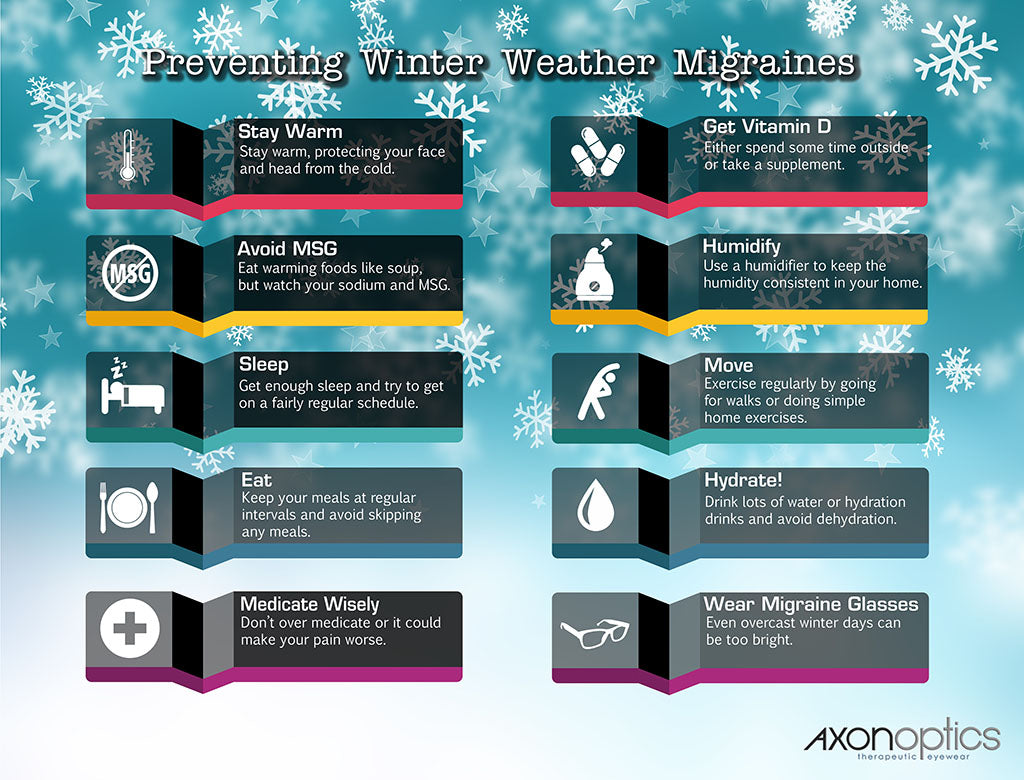Cold weather migraine attacks are no fun. With winter in full swing, you might find yourself experiencing increased migraine activity. Many migraineurs report a spike in their migraine frequency when the weather turns chilly. The cooler temperatures are often a culprit, but certain things we do when it gets cold outside might trigger migraine, too.
A study published in The Journal of Headache and Pain as well as a German study both show a correlation between a change in ambient temperature (particularly cold weather) and migraine. So if you notice you get more headaches or migraine attacks, or they get worse, the cold weather might be the cause.
The reason why people see an increase in migraine headaches during cold weather could be due to a rise in barometric pressure, poorer ventilation in homes from closing windows, less vitamin D, low humidity drying sensitive sinus membranes, changes in the types of pollen exposure, or from increased blood vessel dilation.
Cold Weather Migraine Remedies
Some simple remedies for winter migraine attacks or headaches include staying warm, getting proper sleep, exercise, getting enough vitamin D, maintaining proper humidity, adequate hydration, and avoiding foods containing MSG.
We’ll dive into each of these in more detail below.
Stay Warm
This may seem like common sense, but many people do not dress appropriately for the cold. The stress on your body from being too cold can trigger cold weather migraine attacks, but even just cold air on your face and head is enough to trigger a headache. Wear a hat and scarf, especially if the temperatures dip below freezing. Protect your face and head from the cold and wind.
Sleep
The time change, shorter days, and typically overcast skies of winter can really upset your sleep patterns. Try to get on a fairly regular sleep schedule and make sure you are getting not only enough sleep, but good quality sleep too. A recent study shows that sleep may help stop a migraine attack, but it also suggests that regular, good quality sleep can also help ward them off.
Medicate Wisely
If you are using medication to treat migraine, do so carefully. Overmedicating with prescription or over the counter drugs, especially ibuprofen, can cause rebound headaches. These medication-overuse headaches can be worse than the original pain you were fighting. The real trouble is, you get a worse headache and take more medication which only exacerbates the problem.
Avoid Drafts
Sitting in drafty areas may encourage cold weather migraine attacks for some people, especially if cold air continuously hits your face. One study showed a link between cold weather and wind (drafts) and migraine exclusively in female subjects. Use guards on your windows and doors, and make sure your home is properly insulated. Do what you can to keep the temperature in your home consistent with no drafts.
Eat
Skipping meals may bring on migraine attacks for many, so just don’t do it. One study showed that skipping meals is a strong migraine trigger, almost on the same level as stress. Carry healthy snacks with you for those times that you can’t get away to eat. Try to keep your meals on regular intervals. Your body will thank you.
Get Vitamin D
A study conducted at the Cincinnati Children’s Hospital Headache Centre showed that more than 40 percent of the subjects with chronic migraine were deficient in Vitamin D. Fish and eggs are rich in the vitamin, or you can spend a little time outside if it isn’t too cold. There are also supplements available so you may choose that route.
Humidify
Winter air tends to be dryer and indoor heating systems can zap all the humidity out of the air. One study found that migraineur visits to the emergency department increased with low humidity. Invest in a humidifier and a home humidity monitor. Try to keep your indoor humidity between 35% and 50%since these are considered to be healthy levels.
Move
Exercise can help prevent migraine attacks as well as stave off depression. A study published in The Journal of Sports Medicine and Physical Fitness details the benefits that migraineurs can gain from regular exercise. The good news is, you don’t really have to do that much to reap the benefits. Take a walk, ride your bike, or do a simple home exercise routine three or four times a week. If you’re prone to cold weather migraine attacks you might want to keep your workouts confined to indoors while the temps are low.
Hydrate
There’s no shortage of information that touts the many benefits of water – including helping helping people manage migraine. Make sure that you drink lots of water or hydration drinks during winter weather, especially if you are spending a lot of time indoors. Hydration can also help flush out your system if you have over indulged in sodium-laden comfort food and are feeling the effects.
Avoid MSG
It is such a treat to curl up with a nice, steaming bowl of soup or a hearty stew on a cold winter’s day – and it is a great way to stay warm. However, if you are getting canned or prepared soups, read the labels. These products tend to be full of sodium and MSG. While the research is inconclusive regarding the role that they play in migraine, many people believe they are serious migraine triggers.
Alternative Therapy
At Axon Optics, we offer migraine glasses powered by Avulux lenses. They filter up to 97% of the light wavelengths linked to migraine attacks in a 2016 Harvard study. Additionally, they are the only clinically proven lenses that precisely filter light to help people living with migraine. Check them out here.

References
Bigal, M. E., & Hargreaves, R. J. (2013). Why Does Sleep Stop Migraine? Current Pain and Headache Reports, 17(10). https://doi.org/10.1007/s11916-013-0369-0
Cincinnati Children’s Hospital Medical Center. (2016, June 10). Many with Migraines Have Vitamin Deficiencies, Says Study. Cision PR Newswire. https://www.prnewswire.com/news-releases/many-with-migraines-have-
vitamin-deficiencies-says-study-300283120.html
Clark, J., Hasselfeld, K., Bigsby, K., & Divine, J. (2017). Colored Glasses to Mitigate Photophobia Symptoms Posttraumatic Brain Injury. Journal of Athletic Training, 52(8), 725–729. https://doi.org/10.4085/1062-6050-52.4.04
Fraga, M. D. B., Pinho, R. S., Andreoni, S., Vitalle, M. S. D. S., Fisberg, M., Peres, M. F. P., Vilanova, L. C. P., & Masruha, M. R. (2013). Trigger factors mainly from the environmental type are reported by adolescents with migraine. Arquivos de Neuro-Psiquiatria, 71(5), 290–293. https://doi.org/10.1590/0004-282×20130023
Freeman, M. (2006). Reconsidering the effects of monosodium glutamate: A literature review. Journal of the American Academy of Nurse Practitioners, 18(10), 482–486. https://doi.org/10.1111/j.1745-7599.2006.00160.x
Koseoglu, E., Yetkin, M. F., Ugur, F., & Bilgen, M. (2014). The role of exercise in migraine treatment. The Journal of sports medicine and physical fitness, 55(9), 1029-1036.
Pavlovic, J. M., Buse, D. C., Sollars, C. M., Haut, S., & Lipton, R. B. (2014). Trigger Factors and Premonitory Features of Migraine Attacks: Summary of Studies. Headache: The Journal of Head and Face Pain, 54(10), 1670–1679. https://doi.org/10.1111/head.12468
Scheidt, J., Koppe, C., Rill, S., Reinel, D., Wogenstein, F., & Drescher, J. (2012). Influence of temperature changes on migraine occurrence in Germany. International Journal of Biometeorology, 57(4), 649–654. https://doi.org/10.1007
/s00484-012-0582-2
Turner, D. P., Smitherman, T. A., Penzien, D. B., Porter, J. A., Martin, V. T., & Houle, T. T. (2014). Nighttime snacking, stress, and migraine activity. Journal of Clinical Neuroscience, 21(4), 638–643. https://doi.org/10.1016/j.jocn.2013.08.013
WaterCure.com. (n.d.). The Wonders of Water: Amazing Secrets for Health and Wellness. http://www.tessgodfrey.com/uploads/2/4/9/8/
24985259/the_wonders_of_water.pdf
Yang, A. C., Fuh, J. L., Huang, N. E., Shia, B. C., & Wang, S. J. (2015). Patients with migraine are right about their perception of temperature as a trigger: time series analysis of headache diary data. The Journal of Headache and Pain, 16(1). https://doi.org/10.1186/s10194-015-0533-5
Yilmaz, M., Gurger, M., Atescelik, M., Yildiz, M., & Gurbuz, S. (2015). Meteorologic parameters and migraine headache: ED study. The American Journal of Emergency Medicine, 33(3), 409–413. https://doi.org/10.1016/j.ajem.2014.12.056






